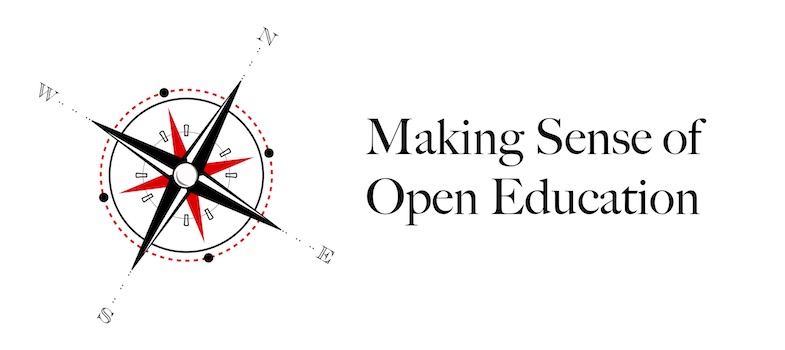meeting the anatomy of the open educator through Wikipedia assignments
Here i go again: Contrasting what is being shared in the course with the use of Wikipedia as an education tool.
An eye for open design
Let's take Geography as the topic of the class. You can go to the Geography portal, then search for the article requests that belong to that portal. You'll find it's a quite nice list of content that you can assist with. This way, you can tweak your plans by connecting to the wikipedian geography crowd and their needs. Don't worry, you can pick just the 1 article, and it doesn't even need to be a new one: you're more than welcome to have your class work on improving (updating, adding sections, illustrating, adding references, ...) an existing article. On that portal you may seek out
What are WikiProjects? They are thematic groups that focus on contents that are particular to a certain discipline or field of knowledge.Ex. Sociology, Medicine, ...
If you really need inspiration, you can always look at this list of requested articles. There have to be quite a few your class can work on. Don't worry, you can always plan for year 1, 2, 3, ...
Each WikiProject has people you can reach out to to discuss your plans and possibly even collaborate with to work on your class designs. They probably won't be educators, rather they will be Wikipedians: They'll have clear ideas of what quality standards look like, what priorities are for new articles, and where improvements are most urgent. (Wikipedians are always open to the idea of improving contents of the Wikipedia, you just need to explain how it's an improvement when it's not immediately clear)
As your reputation within the community grows, you can also expect to be called upon, or even choose to intervene in other wikipedians' work, in order to have (hopefully) constructive discussions regarding contents and the best ways to present them.
A mind for open content
When you (your students) work on a Wikipedia assignment, it's always open. All the contents of the Wikipedia (and the other Wikimedia projects) work under a CC license by default. This is very explicit when you try to upload a picture to Commons, but it's also true of the contents you create and share to Wikipedia. How open you ask? Well, anyone can come right after you've done your contribution and immediately (and, most of the time, constructively) improve on it. Don't worry, you can still clearly see how you contributed on the History tab (especially if your edit was done with your username).
Everything you do on Wikipedia is immediately published and has a CC license on it. That's how radically open we are. The contents you contribute are put to the service of worldwide shared knowledge at once.
Your students' usernames will be exposed (in the history tab). This is a good thing. It's the kind of thing they can mention in their job interviews: "That article on X? I wrote that. You can check all my contributions to Wikipedia on my userpage." If you really believe that your students are headed to the knowledge society, and will be knowledge workers, wouldn't you want them to position themselves as knowledge creators, with verifiable digital footprints?
A Heart to embrace Open Pedagogies
As we've seen knowledge creation is at the heart of the Wikipedia assignments: teachers and students agree on which topics/contents they are going to work on, and the teacher will help them figure out the best sources/references they should use, and the students do the hard work of going through the bibliographic research, creating the contents, and then working through the process of refining them until they're worthy of being published for the world to read.
Can you imagine the difference in agency this makes with traditional teaching (sage in the stage)? Can you imagine the impact of making sure every student feels empowered to generate and publish knowledge?
A Hand in Open Assessment
Peer evaluation makes perfect sense in a Wikipedia assignment: you want your students (or groups) to constructively critique each others' work (before it's published).The teacher's feedback can be timely to foster reflection and encourage mastery learning.
Unavoidably, Wikipedians will come to the rescue: they will come and critique (and possibly delete) your students' work. Yes, they will. Wikipedians are very real stakeholders, and while they're volunteers doing this in their free time and for the love of sharing knowledge, they will enforce the norms and policies of the Wikipedia.
A discoverable presence
When engaging on Wikipedia assignments, students will have to create their accounts to work. They can expand their userpages as they see fit, and can be contacted there (usually by Wikipedians, sometimes to congratulate them on their excellent work, and other times... for lodging complaints for lack of respect of Wikipedia norms on the contents they are working on).
As mentioned earlier, that username can become part of a CV: if you're interviewing someone for a junior architect position, wouldn't you rather hire someone that has created the articles of the 30 most relevant buildings of your city, articles which you can read and verify (albeit shared) authorship?
